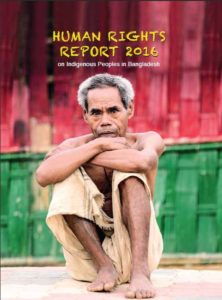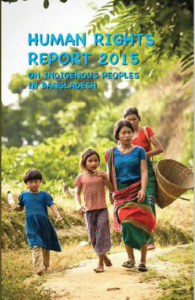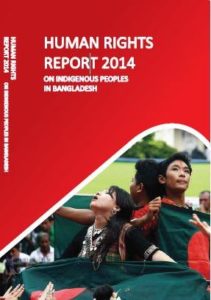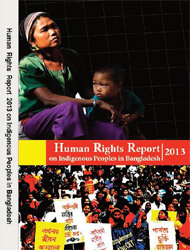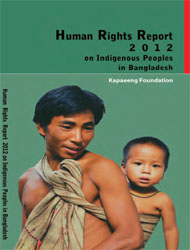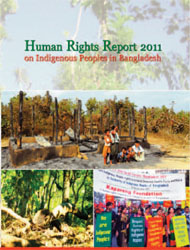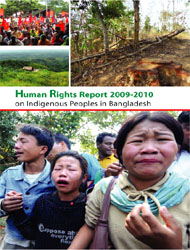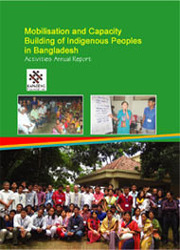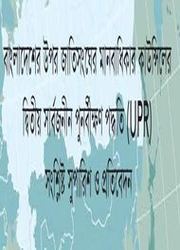Khasis livelihoods are in danger: 72 Indigenous Khasi families may lose their ancestral their land
Livelihoods of indigenous Khasis people in Kulaura upazila under Moulvibazar district are in danger. More than 500 indigenous Khasi people of 72 families may lose their ancestral their land as Jhimai tea garden authority planned to cut down 2,100 trees in the area where Khasi people cultivate betel leafs.
Around 300 indigenous Khasi families are living in fear of eviction from their ancestral land in Jhimai punjee under Kulaura upazila of Moulvibazar district. Khasi families have been living for hundreds years in the land following the Jhimai Tea Garden authorities’ move to set up demarcation pillars with the help of upazila administration.
On 11 April 2015 the tea garden officials along with Upazila Nirbahi Officer of Kulaura upazila went to the Jhimai punjee to set up over 100 demarcation pillars. After installing only three pillars authorities has left due to the protest of indigenous Khasi people.
The families who have been living in the punjee most of all are betel leaf cultivator and it is the main source of income. There are around 2,100 trees in the area where Khasi people live as they traditionally conserve woods for cultivating betel leafs in the forest.
But recently the tea garden management had got government permission for cutting 2,096 trees down in the leasing area. So tea garden authorities started to cut the trees of owned by Khasi people. Cutting the trees would threaten the Khasis’ existence and their livelihood and it would also affect the environment. The land dispute had been going on for a long time between tea estate authority and Khasi people and administration was trying to resolve it.
It is learnt that on 15 April 2015 in a compromise meeting between both parties, the tea estate authorities wanted to give 2.0 acres of land to each of those Khasi families but they refused it. They said, 2.0 acres of land will be inadequate for each family to cultivate betel leaf and demanded 5.0 acres of land with legal rights.
Tea estate authorities have been trying in many ways to evict Khasi people. After the meeting, the tea garden authorities closed the lone Jhimai punjee gate by which Khasi families of that area move. So they could not move out. On 18 April 2015 Saturday they closed the gate and the gate is patrolling by 12/13 workers of the tea garden.
Rana Surong, headman of the Jhimai punjee said that the district administration was working in favour of the tea estate management and trying to evict them from the land where they had been living for generations. The authorities blocked the road so their children could not go to school and retailer of betel leaf could also not come to punjee to collect leaf. Their livelihoods are in danger, he added.
Kamrul Hasan, Deputy Commissioner of Moulvibazar district clamined that it was khas land but he did not know whether it was under the district administration or the forest department. But the land belonged to Khasi people as per ILO Convention No. 107 and in indigenous society there is no khas land. All indigenous people are the collective owner of the land.
On 22 July 2015 the Kulaura upazila administration has taken initiatives to resolve the conflict between indigenous of jhimai pan punjee and jhimai tea-garden authorities of Moulavibazar. So to resolve the dispute, a meeting was organized between the Pan punjee indigenous peoples and the Tea Garden authority. However, after negotiations with the amount of land the meeting ended without any decision. On 15 July 2015 Wednesday the administration officials visited Pan punjee, led by Jamal Uddin Ahmed, Divisional Commissioner of Sylhet.
Deputy Commissioner (DC) of Moulvibazar district Md. Kamrul Hassan, Additional Deputy Commissioner (Revenue) Prakash Kanti Chowdhury, Upazila Nirbahi Officer (UNO) Md. Nazmul Hassan, Assistant Commissioner (Land) of Kulaura Alamgir Hossain and among the tribal leaders, the general secretary of the Kubaraj Anta-punjee, Pan Punjee Organization Flora Babli Talang, the divisional president of Bangladesh Indigenous Peoples Forum Gouranga Patra, general secretary of Khasi Social Council Fila Patami, Montree of Jhimai Punjee (punjee pradhan) Ranasuram and the manager of jhimai tea garden Zakir Hussain Sarkar were also present at the time.
During the meeting, both sides highlighted their views. In the meeting as negotiations the Divisional Commissioner has given a time limit of 10 days for decision-making to punjee dwellers.
According tothe local administration and some indigenous people, Jhimai Pan punjee is the village of Khasi indigenous people and they have been living there from many years. A territorial dispute has been going on for a long time between Pan punjee and Jhimai tea garden authority. When the Jhimai tea garden authorities took the initiative to extend the tea garden, panic of eviction has been create among the indigenous Khasi peoples. The local administration has taken many initiative steps to resolve the disputes. But the indigenous peoples didn’t agree with the initiative because it’s not familiar with their livelihood and tradition. There are more than 500 indigenous peoples of 72 families living in the Punjee. Flora Babli Talang, general secretary of Kubaraj Anta-punjee Organization said that fhe Divisional Commissioner offered the Punjee indigenous people 2.0 acres of undisturbed land to each family in the meeting. But in the 2.0 acres of land is not possible to cultivate the betel leaf and their livelihood, so they demanded for 5.0 acres of land for each family in the Punjee.
The matter was not resolved in the meeting so the punjee dwellers sought for some amount of time. Mr Kamrul Hasan, District Commissioner of Moulavibazar district said that the Divisional Commissioner came to solve the issue permanently. There is no law in Government to give 2.0 acres of land to anyone. Considering the humanitarian aspect of their culture and livelihood, administration proposed to the government to provide 2.0 acres of land. Now they have been asked to come to conclusions with time.



